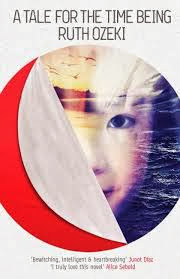
A TALE FOR THE TIME BEING is an interesting novel, but it would have been better if it hadn’t been trying quite so hard to be quite so interesting.
It weaves together three or four narrative voices, with the dominant ones being that of a Japanese teenager who is considering suicide and an American author who is depressed over her incomplete memoir. The voice of the Japanese girl is fresh and believable, and the author does a great job of keeping you hooked on her story as she thinks about killing herself. The voice of the author, on the other hand, is deadly dull. Try this:
“Their access was supplied through a 3G cellular network, but the large telecommunications corporation that provided their so-called service was notorious for selling more bandwidth than it could provide”
Wow. I would be bored if I heard this at a dinner party, never mind paid good money to read it in a novel. Worse yet, this character likes to give us detailed descriptions of her dreams. I mean, how does anyone attain adulthood without receiving this memo: TELLING PEOPLE ABOUT YOUR DREAMS IS NEVER, EVER, INTERESTING. NO ONE WANTS TO HEAR. THEY ONLY LISTEN OUT OF POLITENESS. The author even makes one long dream sequence (which rest assured I skipped) into a major plot point in the novel.
The novel hinges on the fact that the diary appears to be changing as the American woman reads it, which leads the author into an unfortunate musing on quantam theory, a field she is clearly unqualified to discuss, which means the novel rather peters out at the end.
A TALE FOR THE TEAM BEING is still worth reading however, for the Japanese girl’s story – it’s like a rather good novel hidden deep inside a rather bad one.
